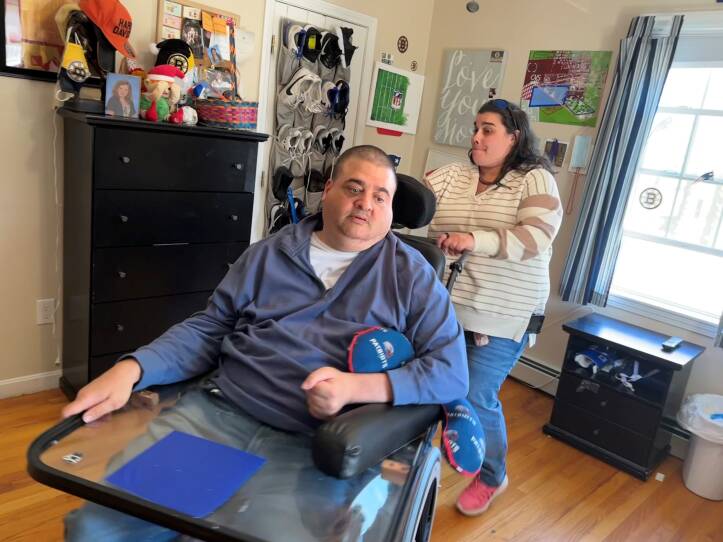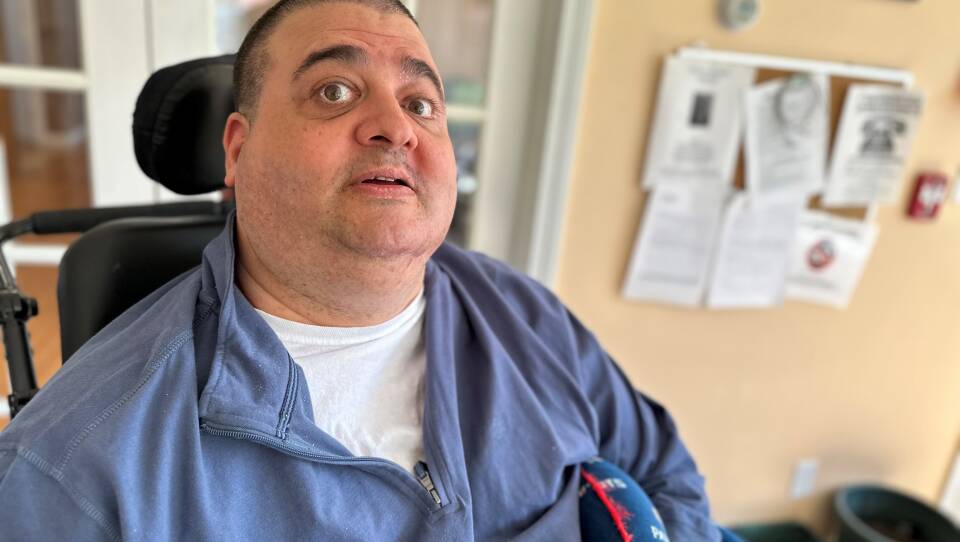At a group home for people with brain injuries in Haverhill, Donnie Duggan nodded with pride towards a painting he made of Boston's Fenway Park. He took some artistic license, depicting the Green Monster, its iconic left field wall, in bold red.
That Fenway painting is one of several he created before the pandemic when he was in a day program in Newburyport for people with developmental disabilities. The program reopened after it went on hiatus during the COVID-19 outbreak, but Duggan hasn't been able to go back, because the program doesn't have the staff needed to support him.
Duggan was in a serious car accident in 2001 which paralyzed his left side. Because of Duggan's disability and large stature, he often needs at least two people to help move him and attend to his daily needs.
In day programs like the one Duggan used to attend, participants learn communication and daily living skills, and take part in activities like exercise and arts and crafts. He misses his friends and said he's bored by the daily routine at his Haverhill group home.
“I get stuck here all day ... I just want to get back to [my friends],” Duggan said. “Hey, I'm still alive."
Advocates say up to 3,000 Massachusetts residents are waiting for a placement in these much-needed day programs, which are facing the same staffing shortages seen in other social service fields. Too few people are applying for these low-paying jobs, they say, leaving people like Duggan without programs that serve as a crucial link to the outside world.
The critical shortage of day programs for people with developmental disabilities is one of the key challenges for state government raised through GBH's “Have Your Say: Gov. Healey’s Agenda” project.
"There are thousands of adults with developmental disabilities that are not being served or we consider them underserved — very, very few services,” said Maura Sullivan, senior director of government affairs and health policy for the ARC of Massachusetts, an advocacy organization for people with intellectual and developmental disabilities and their families.
"I think of it as really a systemic failure,” Sullivan said. “And we're really waking up to the fact that, you know, human services is a workforce that has been neglected in terms of rate increases."

The state sets those rates, which are currently about $16 an hour for people working in these day programs.
"And that's not enough to live well in Massachusetts,” said Mike Hyland, president and CEO of Venture Community Services, which runs group homes and day programs for people with developmental disabilities. “I would say the majority of our people, in fact, end up working multiple jobs in multiple different agencies just to make ends meet."
Hyland said he has 60 full-time positions and about 80 part-time jobs currently open. But it's hard to compete with fast food chains and other jobs that are paying similar rates.
Because of the staffing shortage, Hyland said, day programs now have waitlists to get in.
"And I don't know of an agency, certainly of our size, that doesn't have that same kind of waiting list," he said.
Ellen Attaliades, president and CEO of the Association of Developmental Disabilities Providers, said the shortage is preventing agencies from reaching ideal client ratios.
"One of the targeted groups that are not getting services are those that are medically complex or are behaviorally challenging because it takes more staff to work with them," she said. "So there might be a staff-to-client ratio of 1-to-1 that programs are not able to provide right now."
The lack of access to programs also impacts families of people with developmental disabilities. Carrie Howland's 23-year-old son Bobby has Down syndrome, and lives at the family’s home in Scituate. He has a number of medical conditions.
"He's not fragile, but he's complex,” Howland said about her son. “Think of a house of cards that's beautiful and can trickle down quickly."
Howland said she would like to work, but can't because she doesn't have any help watching Bobby during weekdays.
"He hasn't had a structured program with peers in three years," she said.
Howland needs to have knee surgery but has been putting it off because her son can't get into a day program.
"I can't risk not being able to recover from a major surgery — I need it on both of my knees — until I know that he is completely covered,” Howland said. “And we're nowhere near having an option."
"I get stuck here all day ... I just want to get back to [my friends]."-Donnie Duggan
Advocates say this issue is on Governor Maura Healey's radar screen.
In her proposed FY2024 budget, the governor included $200 million to support day programs run by the state's Medicaid program, MassHealth.
"That is going to help MassHealth providers increase the rates probably up in and into the twenties, we hope, which is fantastic,” said Maura Sullivan of the ARC of Massachusetts. “So this is really good news. We are advocating now to maintain that $200 million through Governor Healey's budget.”
Even if the Legislature does approve that money, advocates say it won’t be enough to solve the problem, because only about half of these kind of day programs are funded by MassHealth. The rest of them are run by the state's Department of Developmental Services.
"I don't think the workforce crisis is going to end very quickly,” said DDS Commissioner Jane Ryder. “So we're trying a number of different avenues to deal with this issue. "
Those include finding possible alternatives that are less staff-intensive, like programs out in the community, Ryder said.
Advocates are asking for a boost of $5.6 million to support day programs run by the Department of Developmental Services. They're also pushing for passage of new legislation that would require the state to pay higher rates for workers in those programs.
For people like Donnie Duggan who need individualized care, getting out of his home on a daily basis can’t happen without staff who are paid to do that work. Being able to do that again would make a big difference in his life, he says.
"Seeing people every day, seeing them personally, it hits a spot in your heart," Duggan said.
This story is the result audience submissions to a collaboration between GBH News, NEPM in Western Massachusetts and CAI on the Cape. Do Gov. Maura Healey's priorities align with the issues that are top of mind for you? Tell us what you think her focus should be.







